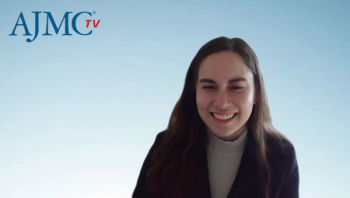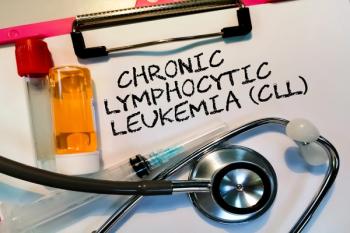
- January 2025
- Volume 31
- Issue Spec. No. 1
- Pages: SP54
John Burke, MD, Discusses Survey on Venetoclax Uptake Among Community Physicians

Key Takeaways
- Treatment choice in CLL involves indefinite BTK inhibitors or fixed-duration venetoclax, with TLS management being a significant challenge.
- Oncologists emphasize education and efficient processes to manage venetoclax initiation, addressing TLS and logistical concerns.
For a patient newly diagnosed with chronic lymphocytic leukemia (CLL), no decision matters more than the selection of a treatment strategy. The good news is that patients have options. The more challenging news is that different options present pros and cons, and the ability for physicians and patients to manage some options can factor into decisions.
Choosing between a Bruton tyrosine kinase (BTK) inhibitor, which has meant indefinite treatment, or a fixed-duration regimen that includes the B-cell lymphoma 2 (BCL2) protein inhibitor venetoclax (Venclexta; AbbVie) is often the first key decision physicians and patients make together. A fixed-duration regimen can have obvious appeal, but management of venetoclax, which can cause tumor lysis syndrome (TLS) at initiation, is not easy. Starting the drug requires an 8-hour day of monitoring to ensure safety, with additional long days at ramp-up.
To better understand decision-making at the community level, a group of investigators led by senior author John Burke, MD, of SCRI at Rocky Mountain Cancer Centers | The US Oncology Network in Colorado surveyed 103 oncologist-hematologists and advanced practice providers in June 2024; 91% were physicians, and 94% reported initiating venetoclax in their practice. Providers had at least 5 years of experience treating patients with CLL post residency, treated at least 10 patients with the disease per year, and were currently treating at least 1 patient with venetoclax.
Burke responded to questions from The American Journal of Managed Care (AJMC) about the survey results, including what might catch the attention of payers.
AJMC: Please discuss the most important takeaways from the survey and which responses will generate the most interest or concern.
Burke: We interviewed oncology-hematology professionals with experience in CLL. We asked them what concerns they have with initiation of venetoclax in patients with CLL, and their top 3 concerns were the management and monitoring for tumor lysis syndrome, the logistics of getting the patients in and out of the clinics, and getting the laboratory [tests] done quickly enough to ensure patient safety.1
We then asked them what processes they were using in their clinics or had implemented in their clinics to alleviate those concerns to the best of their ability. The most common answer was education: They educated the patients, the staff, and themselves about how to do this correctly.
A number of other processes were included in terms of making sure that laboratory [tests] can be turned around quickly, in a stat fashion, providing treatment calendars for patients to make sure they know when to take their medicine, when they need to be there for the laboratory [test], and when they need to be there for their appointment.
We also asked them what percentage of the time they spend talking to patients about both fixed-duration options, like venetoclax, and non–fixed-duration/indefinite therapies, such as BTK inhibitors. These were experienced providers, so the majority of [the] time they were providing all options to their patients, but it was less than half of the time that they were administering fixed duration of venetoclax compared with other options in patients [with] CLL.
The take-home message is that for doctors who aren’t routinely administering fixed duration of venetoclax, there are techniques available, and this study is designed to understand what techniques experienced doctors are using when they start people on venetoclax to be more comfortable with and administer the treatment safely to their patients.
AJMC: Can you discuss the risk of tumor lysis syndrome and why it is a challenge when starting venetoclax? What advances in managing this risk have occurred since the introduction of venetoclax?
Burke: Tumor lysis syndrome is a risk of venetoclax when you start patients on the treatment. The reason it’s a challenge is that patients have to come in very frequently for their laboratory [tests], they have to take their medicine at a certain time, and physicians have to monitor them for the development of tumor lysis syndrome. All that said, there are now studies emerging [with findings] that indicate that when you start someone on venetoclax and obinutuzumab, their risk of tumor lysis syndrome is very low. It’s a lot of monitoring for a low risk.
We’ve learned that when you do administer the fixed-dose venetoclax properly per the package insert, meaning you follow the risk-adaptive tumor lysis prevention strategies and give obinutuzumab first for 3 weeks, the risk of TLS is very low—really just following the label makes things very safe.
AJMC: Is there a population for whom the fixed-duration therapy offers a particular benefit? Who are these patients and why?
Burke: Examples might be patients who live relatively close to the clinic and those who have cardiac problems who don’t want to go on a BTK inhibitor. Venetoclax is probably a safer option for those patients. In contrast, those who may live a long way from the clinic and have trouble making it into the office for regular laboratory tests required during the ramp-up phase may not be the most appropriate patients for venetoclax. Those are factors that doctors can consider when starting people on initial therapy for CLL.
AJMC: At ASH [66th American Society of Hematology Annual Meeting & Exposition in San Diego, California], investigators reported additional results involving fixed-duration combinations involving venetoclax. What findings do you feel have the most practice-changing potential?
Burke: One of the key findings at ASH is [from] the AMPLIFY study [NCT03836261],2 which is looking at the combination of the acalabrutinib [Calquence; AstraZeneca] and venetoclax as a frontline treatment for CLL. If this were to lead to an FDA approval, it would provide another option for patients to take an all-oral fixed-duration doublet therapy as initial therapy for CLL as opposed to the current options, which are indefinite, non–fixed-duration BTK inhibition or venetoclax-obinutuzumab. There may be this third all-oral combination that emerges out of the AMPLIFY study [findings]. I would point to that as the most relevant frontline trial that might have practice-changing potential in CLL.
AJMC: What aspects of the survey results should be of interest to payers?
Burke: The final conclusion, or the final figure in the poster, would be most interesting to payers, as it tells us a little bit about what oncologists are doing; it’s only about one-third of oncologists who are using fixed-duration therapy for the majority of their patients, and that means about two-thirds are not and that non–fixed-duration therapy is more expensive. If physicians keep a patient on a BTK inhibitor for 7 or 8 years, that’s going to be more expensive than 1 year of fixed-duration therapy. So from a payer standpoint, I would say that’s probably the most interesting [aspect].
References
1. Jacobs R, Fletcher L, Rettew A, et al. Best practices to overcoming challenges in initiating venetoclax for patients with chronic lymphocytic leukemia: results from a United States community-based healthcare practitioner survey. Blood. 2024;144(suppl 1):2268. doi:10.1182/blood-2024-198466
2. Brown JR, Seymour JF, Jurczak W, et al. Fixed-duration acalabrutinib plus venetoclax with or without obinutuzumab versus chemoimmunotherapy for first-line treatment of chronic lymphocytic leukemia: interim analysis of the multicenter, open-label, randomized, phase 3 AMPLIFY trial. Abstract presented at: 66th American Society of Hematology Annual Meeting & Exposition; December 7-10, 2024; San Diego, CA. Abstract 1009.
Articles in this issue
Newsletter
Stay ahead of policy, cost, and value—subscribe to AJMC for expert insights at the intersection of clinical care and health economics.







